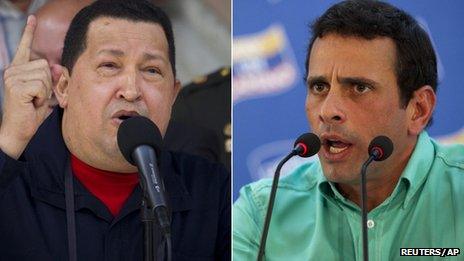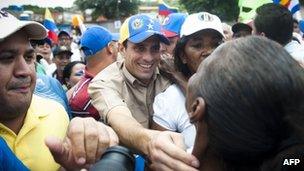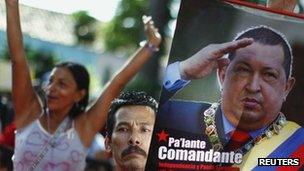Venezuela's Chavez and Capriles set for election battle
- Published

Now it is official. Hugo Chavez and Henrique Capriles will contest Venezuela's presidential election in October.
In fact, the formal registration of the two candidates - Mr Capriles on Sunday and Mr Chavez by Monday's deadline - merely confirms what had long been expected.
But the registration removes any lingering, albeit tiny, doubt over whether President Chavez, beset by health problems, would be on the ballot.
Although campaigning does not officially begin until 1 July, there have already been plenty of election-related events.
Mr Capriles was chosen in a primary election in February, with the opposition unifying behind one candidate in a bid to unseat Mr Chavez from office after 13 years.
Since the primary, Mr Capriles has been criss-crossing Venezuela on a "house to house" tour, visiting poor neighbourhoods where residents complain about rickety houses and a lack of running water.
The 39-year-old lawyer has appeared full of energy, greeting crowds, hugging admirers and speaking at town-hall style meetings.
That is in contrast to the president.
Low profile
Usually an ubiquitous presence on state television and radio, Mr Chavez's public appearances have been slashed to a minimum following treatment for cancer.
Since announcing his illness to the world a year ago, President Chavez has refused to divulge details of its exact nature, extent and his prognosis.
The chemotherapy and radiotherapy that he has received over the last year have clearly taken a toll, sowing seeds of doubt about his ability to campaign and to lead the country for a further six-year term.

Henrique Capriles has been out on the election trail over the past few months
Vice President Elias Jaua and other ministers have been deputising for him.
"On 7 October we'll be defending the future. The only guarantee of keeping an independent country is with Chavez," Mr Jaua said during a recent event in Caracas' biggest slum.
Government supporters argue for continuity as the only way to ensure benefits to the poor continue.
Mr Chavez is credited with increasing access to healthcare and education for the poorest sectors of society.
The president himself said this week if he won a new mandate to govern until 2019, socialism would cross the barrier of no return in Venezuela.
For his part, Mr Capriles has shied away from saying he would dismantle programmes set up by the current administration were he to win, but his economic policy would be markedly different.
He has called the policy of expropriations "a failure" and said it would not continue during his presidency.
Crime crackdown
What appears to worry people most in Venezuela is security.
"When you ask what are the main problems of the country, insecurity explains all the worries that Venezuelans have," says Luis Vicente Leon from the Caracas polling firm Datanalisis.
Mr Chavez has recently stepped up efforts on insecurity, overseeing a new ban on the sale of guns and ammunition, creating special prosecutors to deal with cases of extortion and kidnap, and promising to build new jails.

Opinion polls continue to put President Chavez in the lead
Mr Capriles meanwhile launched his "Security for All" plan at the end of May, telling his audience in Caracas: "We want a country where justice reigns."
The plan includes increasing access to education, reducing corruption in the police and judicial system, and improving the country's prisons.
But tackling crime is not going to be enough to win the election.
Mr Leon says their research shows that unemployment, inflation and corruption are also major concerns.
Whatever decides the outcome, this election will be watched with interest around the world.
World watches
Mr Capriles has said he is open to having fruitful relations with any country that can be of benefit to Venezuela.
Mr Chavez has tried hard to cultivate relations with other left-leaning governments in the region and the world and has been openly hostile to the United States.
Should Mr Chavez lose, there would be serious implications for Cuba, which has sent thousands of workers to Venezuela in the health sector and the military in exchange for cheap oil.
Other countries in the region have also relied on a Chavez-run Venezuela for access to cheap oil (such as Nicaragua and Jamaica) or political support (like Argentina and Ecuador).
Elsewhere, countries like Iran, Syria, Russia, Belarus and China would be losing a staunch ally if Hugo Chavez were defeated by Henrique Capriles.
With four months to go until elections day, opinion polls show Mr Chavez in the lead.
But with a united opposition and a cancer diagnosis to contend with, this election campaign will be no easy ride for the president.
- Published18 February 2013
- Published3 October 2012